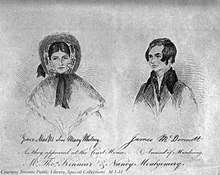Grace Marks
Grace Marks (c. July 1828 – after c. 1873) was an Irish-Canadian maid who was involved in the 1843 murder of her Richmond Hill, Ontario, employer Thomas Kinnear and his housekeeper, Nancy Montgomery. Her conviction for the murder of Kinnear was controversial and sparked much debate about whether Marks was actually instrumental in the murder or merely an unwitting accessory.
Grace Marks | |
|---|---|
 A sketch of Grace Marks alias "Mary Whitney" and James McDermott as they appeared at their trial. | |
| Born | c. July 1828 |
| Died | after c. 1873 |
| Nationality | Irish-Canadian |
| Other names | Mary Whitney |
| Occupation | Maid |
| Known for | Murder conviction |
Early life
Marks was born and raised in Ulster in Ireland and had eleven siblings, three of whom were stillborn. The Marks' father, John, was a stonemason and an abusive alcoholic. The family immigrated to Canada in 1840 when Grace was twelve. Her mother died on the ship en route to Canada and was buried at sea.
Kinnear murder
Marks was employed as a maid in the house of Yonge Street farmer Thomas Kinnear, who was in a sexual relationship with his housekeeper, Nancy Montgomery. On July 18, 1843, Kinnear and Montgomery were murdered by a servant.[1] Kinnear was shot and Montgomery, who was pregnant at the time of her death, was hit on the head with an axe and subsequently strangled before being dismembered and hidden under a large tub.[2] Under the alias "Mary Whitney", Marks and the servant, James McDermott, fled together to the U.S., but were apprehended in Lewiston, New York and deported to Toronto. It remains unclear whether Marks had actually taken part in the double murder.[2]
Marks was tried with McDermott for the murder of Kinnear. A trial for Montgomery's murder was to follow, but was deemed unnecessary as both defendants were convicted of Kinnear's murder and sentenced to death. McDermott was hanged, but Marks's sentence was commuted to life in prison which she served in Kingston Penitentiary. At one period (May 4, 1852 – August 18, 1853) she was committed to an asylum but was later returned to Kingston Penitentiary. In 1872, after almost thirty years of incarceration, Marks was pardoned and moved to northern New York. After that she disappeared.[2]
Popular portrayal
What is known of Marks on the historical record comes primarily from Susanna Moodie's book Life in the Clearings Versus the Bush. She is the subject of Margaret Atwood's historical fiction novel Alias Grace and played by Sarah Gadon in the 2017 television adaptation directed by Mary Harron.[3] Alias Grace was adapted for the stage by Jennifer Blackmer and premiered at the Rivendell Theater in Chicago on September 1, 2017.[4]
Bibliography
- Margaret Atwood: Alias Grace: London: Bloomsbury: 1996: ISBN 0-7475-2787-3
- Gina Wisker: Margaret Atwood's Alias Grace: A Readers Guide; Continuum: 2002: ISBN 0-8264-5706-1
References
- Stamp, Robert M. "The Kinnear Murder Case". Early Days in Richmond Hill: A History of the Community to 1930. Richmond Hill Public Library Board. Archived from the original on August 3, 2016.
- Katz, Briget (November 1, 2017). "The Mysterious Murder Case That Inspired Margaret Atwood's 'Alias Grace'". Smithsonian Mag. Retrieved 15 October 2018.
- Maane Khatchatourian (21 June 2016). "Netflix Nabs Sarah Polley Miniseries Based on Margaret Atwood True-Crime Novel". Variety. Retrieved 30 June 2016.
- Jones, Chris. "The Margaret Atwood story of 'Alias Grace' gets inside your head". chicagotribune.com. Retrieved 2018-11-03.
External links
- The Trials of James McDermott and Grace Marks at Toronto, Upper Canada, November 3rd and 4th, 1843, for the murder of Thomas Kinnear, esquire, and his housekeeper Nancy Montgomery., including the voluntary confession of Grace Marks and accounts of both trials
- Life in the Clearings Versus the Bush, Susanna Moodie (1853) and newspaper accounts of the day.